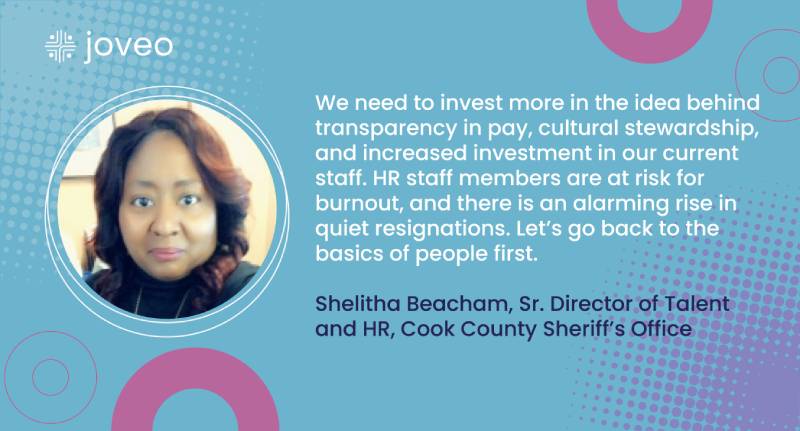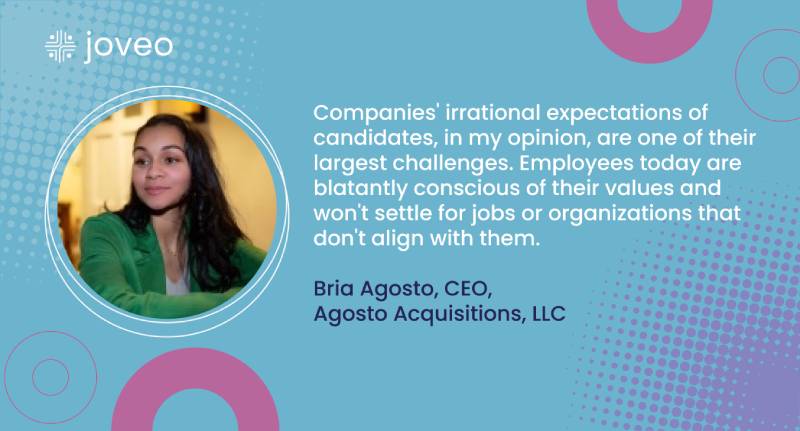If there are 10 million job openings and only six million available workers, why is it so hard to find talent? What is the reason for less hiring? This question is on the mind of many career specialists, as we move further from the pandemic into a possible recession.
This can be frustrating for both job seekers and the staff attempting to hire them, but where is the communication gap stemming from? To help bring more clarity to the situation, and attempt to solve this issue, we brought this question to talent acquisition specialists, HR leaders, and the top rungs of a company’s ladder to see where the problem lies.
From these lived experiences, here are 10 potential causes for why it is so hard to find talent, even with a large applicant pool.

A Need for a Cultural Shift
“With a shortage of workers on the rise, there is not enough staff to keep up with hiring demands or enough flexibility regarding roles that meet the needs of job seekers.
There is a sense of fear for some workers in response to the recent pandemic. On the other side of the spectrum is the struggle to maintain a balance at home with parental responsibilities and increasing costs for childcare, gas, and food. This has led to an unprecedented rate in the rise of entrepreneurship.
We need to invest more in the idea behind transparency in pay, cultural stewardship, and increased investment in our current staff. HR staff members are at risk for burnout, and there is an alarming rise in quiet resignations. Let’s go back to the basics of people first.”
Shelitha Beacham, Sr. Director of Talent and HR, Cook County Sheriff’s Office
A Skill Shortage More Than a People Shortage
“Looking at the number of jobs and available workers doesn’t tell the complete story of the current labor market.
The issue is that many of the open jobs companies are struggling to fill require specific skill sets, and the development of those skill sets in job seekers has fallen far behind the need for them.
This issue has gained the most attention in the tech sector, especially when it comes to candidates with cybersecurity experience, AI/ML knowledge, and other skills related to emerging technologies and increased virtualization, though other industries are experiencing a similar problem.
When this happens, companies with the means to do so raise compensation to lure professionals away from their competition, but that just shifts the vacancy elsewhere.
Until the supply of candidates with these in-demand skills increases, it will be a struggle to fill the positions that need them, even if those numbers were to reverse.”
Jon Hill, Chairman and CEO, The Energists
Perfect your talent sourcing with community outreach, DE&I events, employee referrals, and more.
Make Successful Talent Sourcing a Reality!
An Unwillingness to Be Flexible With Experience Levels
“There are many trades and fields in which there are sizable gaps in skilled individuals, both for technical jobs and trades. However, employers’ expectations for entry-level positions have also increased tremendously and some job seekers cannot keep up with them.
We expect graduates to have years of experience in the field right out of college, which can be unrealistic in most cases. Highly-skilled individuals with no experience and those with the experience but not the certifications are often not considered for open roles. The lack of talent is two-fold with employers becoming too inflexible and jobseekers not being prepared for the expectations of the job market.”
Liz Hogan, Career Development Specialist, Find My Profession

Wrong Audience for a Specific Role
“The people who used to do the roles you filled now expect more. Things like health benefits or remote options are no longer perks but are assumed. “What else ya got?” is a common attitude, and what any skilled or experienced talent is thinking when they see your posting.
So, meet these new expectations or find a new audience who see your offers as a huge win. The candidate who is thinking, “wow they’re going to give me XYZ, when can I start!?” are the people your posting isn’t finding…yet.”
Juan Kingsbury, Talent Strategist, Career Blindspot
The Popularity of Remote Work
“Many jobs still require local workers to get by. We’ve entered a time where remote work isn’t only on the rise in popularity but also competitive financially as well.
Remote jobs can offer equal or better pay, a more flexible home/life situation, and match benefits with even the best local jobs. With the impact of inflation on things like food and gas, saving money by not having to buy lunch and drive to work become factors in decision making.
In this environment, we have many workers who rightly clamor to find well-compensated remote work, which can leave jobs with physical location demands at something of a disadvantage.
Likely, we’re going to need to see a lot of these physical location jobs up the ante as far as compensation and benefits in order to compete with remote work. Only time will tell how well this will work out. It will be on the company’s side to figure out what they need to attract people back to the office.”
Soji James, Owner, 1AND1 Life
Prospective Candidates Avoid Lateral Career Moves
“Seventy percent of companies admit that they are struggling to fill their open positions, but that’s definitely not because there aren’t enough people looking for work.
From what I’ve seen, it’s because a lot of teams are understaffed to the point that they don’t have the bandwidth to train, coach, or mentor right now, and that means they have to find someone with experience.
Companies are primarily looking for candidates that have already proven that they can do the job (i.e., coded in the same languages or sold similar products), so they can come in and hit the ground running. The challenge with this is that people don’t generally want to make a move for a job they’ve already been doing; they are looking for that next step in their career. It’s a bit of a catch-22, really.”
Alyssa Rhoda, Director, Talent Acquisition, Zefr
The Best Brands are Too Attractive to Most Applicants
“It’s hard to find talent because top-tier brands are often the ones that are the most competitive. The best talent only wants to work for the best companies.
Another reason it’s hard to find talent is that many applicants already have jobs. The job market has been improving in recent years, so many people who were unemployed during the recession have found jobs and are now less available to be recruited.
Finally, finding good talent can be tough because some candidates just aren’t looking for a new job. They may be happy with their current position, or they may not think there are any good opportunities out there.
Despite these challenges, it is still possible to find outstanding talent. You can use tools like job boards, social media, and recruiters to find the best candidates, or you can take proactive steps such as creating an attractive company culture or offering.”
Connor Ondriska, Co-founder and CEO, SpanishVIP

Unrealistic Salaries to Match Candidate Experience
“Companies’ irrational expectations of candidates, in my opinion, are one of their largest challenges. It is unjust and demotivating for a hiring team to ask a candidate with 10+ years of experience to accept positions paying less than $100,000 annually.
This demonstrates two things: either not enough market research was conducted, or recruiting managers and CEOs did not give employees’ career health top priority. Employees today are blatantly conscious of their values and won’t settle for jobs or organizations that don’t align with them.”
Bria Agosto, CEO, Agosto Acquisitions, LLC
Simplify your app experience and get 360* visibility into the candidate journey with MOJO Apply.Double Your Click-to-Apply Conversions and Improve Candidate Satisfaction 30%+
Staff is Too Short-Handed to Train Properly
“Companies are so short-handed; they do not have the staff to train new people. As a corporate recruiter, I can identify exceptional people with about 60-85% of the transferrable skills the managers are looking for; however, managers are so overworked that they are not available or feel that they cannot spare the time to train people on the skills they are lacking in!
Even if someone is a 100% match there is still a “learning curve” for a new company.
Take the time to train someone!”
Michelle Paquette, Talent Acquisition Partner, Berkadia
Different Perspectives Between Short and Long-Term Positions
“Many organizations are realizing the importance of sourcing a talent strategy to secure the best talent in the marketplace.
By leveraging innovative data solutions and talent acquisition platforms, going beyond traditional recruiting solutions provides organizations with the additional “eyes” and access to talent overlooked based on antiquated position profiles and criteria.
This leads to looking at your workforce planning process. Are the job openings listed necessary? How are companies looking at what is needed from talent to bring the desired end result? There has to be an understanding that some open jobs may be short-term fixes that need a different long-term view.”
Tonia Woodbury, Head of DEI for the Americas, BNY Mellon















